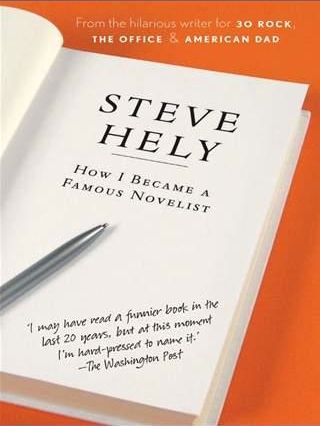
Despite it having a name that makes it sound like a particularly nauseating carnival sideshow exhibit, I’d really like to own one of these. (Image via Core 77)
You are browsing this site using Internet Explorer 7. For a better experience, you may want to upgrade to a newer browser.

A weblog by Christopher Miles

Despite it having a name that makes it sound like a particularly nauseating carnival sideshow exhibit, I’d really like to own one of these. (Image via Core 77)
You’re not getting the most out of your yawns if they only come out one end.
This has been the least focused day a writer has spent since T.S. Eliot accidentally cleaned his spectacles with K-Y Jelly.
One thing I consistently underestimate is the age at which it remains seemly for an adult male to own, and use, a skateboard.
We crazy people are sublime and loyal.
Spy vs. Spy artist Antonio Prohias explaining to Miami New Times reporter Diane Montane that he went straight to MAD magazine with his portfolio after arriving in New York from Cuba in 1960 because of ‘that crazy name’. (From the recently published Spy vs. Spy Omnibus.)
If entropy had a gang and ordered a hit on a guy, light would feed the victim hamburgers until he died of organ failure.
This truly inspired analogy can be found in part nine of pinknantucket press’s series on ‘the enemies of books’. If you’ve ever wondered why the photos on the front of travel agency brochures sometimes look uninvitingly drained of life, here’s where you’ll find the answer.
Mike Lynch at Nannygoat Hill on #artwiculate’s artificial intelligence
I think Douglas Adams writing [Doctor Who] to order for the BBC in 25-minute instalments with this many sets and that many actors is very different from Douglas Adams the radio writer, or Douglas Adams the novelist. The stage directions are peppered through with things like, ‘As many explosions as we can manage’ or, ‘K-9 comes out at what passes for full speed’.
Gareth Roberts on his novelisation of ‘Shada’, a 1979 Doctor Who serial penned by (then script editor) Douglas Adams. The story was abandoned mid-production because of BBC industrial action triggered by a demarcation dispute over the operation of the Play School clock (yes, really), and though the extant footage has been released on home video (with linking narration by Tom Baker), this is the first time the story has been officially adapted in print.
The two other stories Adams wrote for Who — ‘The Pirate Planet’ and the classic ‘City of Death’ — are yet to be (officially) novelised.
I happened to come across this anecdote about the Diamond Match Company, the largest manufacturer of matches in the United States in the nineteenth century
, being persuaded to release their patent on sesquisulfide safety matches (a non-poisonous alternative to white phosphorous matches), allowing competitors to produce safe matches using the patented method.
(T)hose involved in the manufacture of the new phosphorus matches were afflicted with phossy jaw and other bone disorders, and there was enough white phosphorus in one pack to kill a person. Deaths and suicides from eating the heads of matches became frequent. Two French chemists, Henri Savene and Emile David Cahen, developed a safe match using phosphorus sesquisulfide that was patented in 1898. In the United States, the Diamond Match Company obtained the patent for sesquisulfide manufacture in 1900 for a sum of $100,000. President William Howard Taft then wrote publicly to the Diamond Match Company asking them to release the patent for the good of mankind, which they did in 1911.
That ought to silence you hippies out there complaining about those evil, selfish corporations destroying the world! It’s not all oil spills and overworked Chinese factory workers, you long-haired jerks!
The fiction acquisitions editor at a prominent UK publishing house once casually told me that if the voice of a novel manuscript was totally convincing, he could forgive almost anything else that might be wrong with it.
Chris Flynn, author of A Tiger In Eden, writing on ‘authorial voice’ for Meanjin. Flynn is also featured, along with The Chef author Wayne Macauley, on a recent Radio National Books and Arts Daily segment examining techniques for establishing voice (first person, in Flynn and Macauley’s case) in fiction.
Great profile of Armando Iannucci (known most recently for his UK political comedy The Thick Of It) ahead of the launch of Veep, his new (US-based) political comedy for HBO starring Julia Louis-Dreyfus. Also contained in the piece are some interesting observations about comedy, not just from Iannucci but also from his writing partners Simon Blackwell and Tony Roche.
‘It’s the weird thing about comedy,’ Roche said. ‘It’s sort of like boxing. You’re constantly throwing punches, and you might have one really big punch that everyone remembers — the really funny moment — but you’re trying to soften them up the whole time: joke, joke, joke, joke.’
‘Whereas drama’s two people in a boxing ring just looking at each other,’ Iannucci said.
There’s a weird thing where a lot of the best comedies, certainly in this country, seem to come from a place of coming up with really good clever set pieces and then finding a way to join them… conversely, it’s also where a lot of the worst comedies come from, because people come up with set pieces and then find this sort of artificial way of sellotaping them together.
In the second half of this episode of the What Are You Laughing At? podcast, UK sitcom script editor Andrew Ellard (The IT Crowd, Red Dwarf), regular guest James Cary and host Dave Cohen discuss, among other things, finding the middle ground between writing gags and set pieces and motivating characters in believable ways, and the value of writing for dramas and soaps as training for writing comedy.
Pete Holmes in his podcast You Made It Weird has as intrusive a laugh as Ricky Gervais, but that ain’t necessarily a bad thing. Episode 35 with Larry Miller is the first episode I’ve heard, but I expect I’ll be downloading more.

Writing a novel – actually picking the words and filling in paragraphs – is a tremendous pain in the ass. Now that TV’s so good and the Internet is an endless forest of distraction, it’s damn near impossible. That should be taken into account when ranking the all-time greats. Somebody like Charles Dickens, for example, who had nothing better to do except eat mutton and attend public hangings, should get very little credit.
I already read Twitter on the toilet. But that doesn’t mean I’m not tempted to give Shitter a go.
These minimalist, abstract LEGO® portraits of characters from pop culture show you just how iconic some of these creations are, that they can be so readily identified from such basic shapes. Incredible.
One father’s determination against the odds. One gutsy yellow Austin 1100. And one twelve-year-old boy’s prepubescent lust for a ‘sexy air hostess’. A very special road trip to Longleat in 1983 for the Doctor Who 20th anniversary celebration.
The biggest challenge is getting the word out, and that comes as a huge depressing surprise to many people.
Independent Mac software developer Daniel Jalkut (creator of the blogging app MarsEdit) interviewed on the Mac Power Users podcast. As well as expressing a clear-eyed view about the pros and cons of things like the Mac App Store, his comments about self-promotion are not entirely without relevance to authors and other self-employed creatives.
Posted here in case for some reason you haven’t been internetting properly and managed to miss them.
The East End may be crowded with interesting characters but writing 900,000 well-crafted words in less than three years is a towering achievement.
The Guardian interviews the mysterious ‘Gentle Author’ who, over the past two-and-a-half years, has been recording stories and documenting life in Spitalfields in East London.